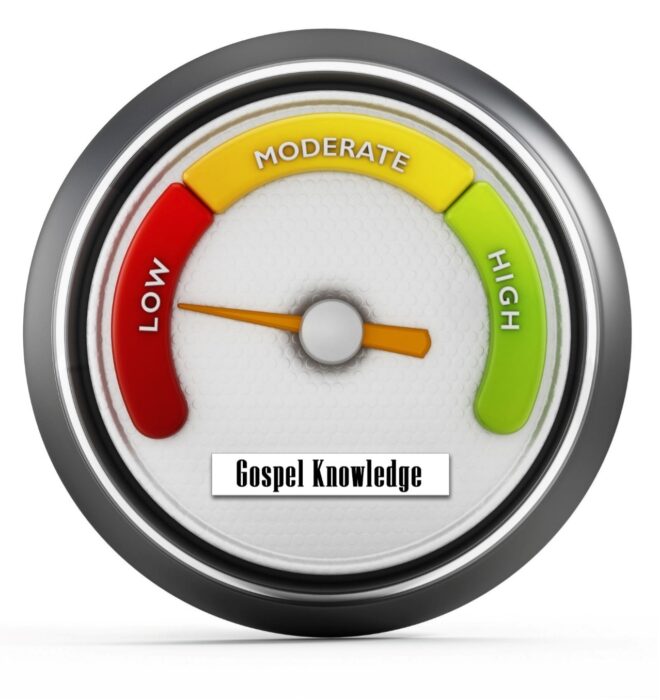How Much of the Gospel Do Your Unbelieving Friends Understand?

We know that Biblical literacy in North America has been on the decline for several decades. What did Noah build? What is the name of the first woman? Who killed Goliath? Where was Jesus born? What is a Pharisee? What is the last book of the Bible?
There are lots of surveys and research studies out there, using these kinds of questions, that tell us that more and more, North Americans know less and less about the people, places, events, and stories from the Bible.
Yes, that concerns me! But it’s only symptomatic of something much more important:
How clearly do unbelievers in North America understand the gospel of Jesus Christ and its potential significance for them? I’m convinced that Christians generally assume that their unbelieving friends know more about the gospel, and understand what they do know, much better than they really do know and understand it.
Case in point: Even though I grew up in the Bible belt of the USA in a time when Bible knowledge was widespread and fairly deep, I didn’t understand the gospel of Jesus Christ until it was clearly explained to me, one-on-one, while I was a senior in high school.
And what was previously a common problem in North America—Bible knowledge without clear gospel understanding—has been compounded by two more recent realities:
One: Children, as well as adults, are not being taught, or even exposed to, Bible content—even in many evangelical churches.
Two: There has been a massive influx of immigrants into North America from Buddhist, Hindu, Islamic, Atheistic, Postmodern, and Post-Christian worldview countries.

In my case, I was coasting through life somewhere between -5 and -4 on the Good Soil Evangelism Scale. I knew there was a heaven and hell. Knew that I was a sinner. Knew the Christmas and Easter stories, but didn’t understand the underlying significance of them. Wasn’t really interested in Jesus and the gospel, although I knew a lot about the historical Jesus but didn’t really know the gospel.
I had never sensed spiritual conviction even though I’d gone to Sunday school and church all through my childhood and early teens. I had never been confronted with a need for a personal faith response.
But I was far enough up the scale that one simple gospel-clarifying conversation was all that was necessary to bring me to a “count the cost” confrontation with truths of the gospel.
But what about…
Your Buddhist and Hindu friends?
Yes, they definitely sense the inner God-Vacuum. They are aware of higher powers. They sense personal spiritual emptiness and look to their traditions to fill that void. Consequently, they end up embracing a set of religious works-based beliefs that do not satisfactorily fill that void, the God-Vacuum. That’s -8 on the above scale.
Your Islamic friends?
Most of our Muslim friends are probably somewhere between -8 and -6. Because of the Prophet Muhammad’s exposure to Judaism and Christianity, Muslims believe in one God—they are monotheists. They believe in Jesus (as a human-only prophet) and some Christian concepts, but historically they have been staunchly opposed to the gospel of Jesus Christ.
But according to a June 28, 2019 article in Newsweek, more Muslims are now turning to Jesus.
Something was happening - even as Christianity was on the wane in many Western countries and vanishing from its roots in much of the Middle East, a wind was blowing through the House of Islam.
By the end of the first decade of the 21st century, reports of large-scale conversions of Muslims to the Christian faith were surfacing in many corners of the "House of Islam."
Your Atheistic or Postmodern friends?
Even they, like all of us, have an inner God-Vacuum that can only be filled with the True God of the Bible—the Creator of Heavens and Earth. However, they prefer to try to ignore the vacuum and deny that a higher Power exists. I can’t speak for all of them, but generally most of my friends in these categories have tried to fill that vacuum with humanistic philosophical explanations, materialist “things,” and in some cases, temporal pleasures. The book of Ecclesiastes, written centuries before the birth of Jesus, has much to say about this ancient worldview.
Your Un-churched or Under-churched “All-American” friends?
Even though your North American home-grown friends grew up surrounded by churches in a land with TV and radio airwaves constantly broadcasting the gospel, don’t overestimate their understanding of the Christian gospel of grace and peace through Jesus. Chances are, they don’t understand much of the gospel—especially “by grace are you saved through faith, not of works.” (my abbreviated paraphrase)
Good Soil Evangelism and Discipleship Training
The Good Soil seminars are specifically designed to help you present the gospel—wherever they are on the scale of Bible knowledge and gospel understanding.

The Story of Hope
An Evangelistic Bible Study for People Wherever They Are on the Scale
The Story of Hope evangelistic Bible for non-Christians who know nothing, little, or even much about the Bible’s redemptive story—the gospel of Jesus Christ. It is available in more than 30 languages, with more being translated all the time.



